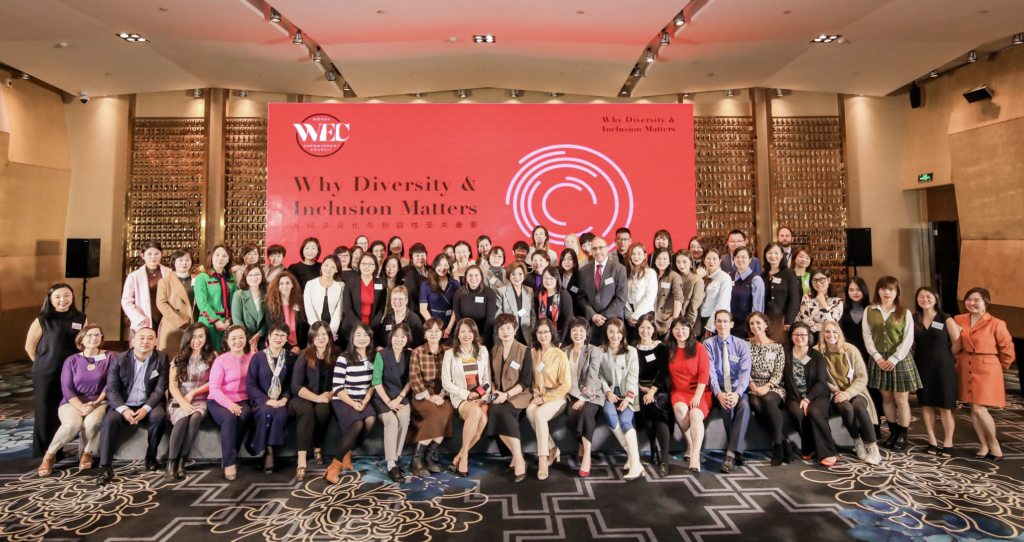On October 19th, the Women Empowerment Council hosted a Diversity & Inclusion Forum in Qingdao.
Around 100 professionals from multiple industries including tech, manufacturing, healthcare, media, hospitality, and education joined us for a day filled with sharing, learning, and influencing.

Our keynote speaker, Tze San Koh – President of China Gas Marketing at ExxonMobil, kicked off the day by sharing why companies should emphasize DNI policies. The data is very clear—diversity and inclusion initiatives increase innovation by 20%, decrease risk by 30%, triple performance, and boost outcomes eight-fold.
But how do we get here? Koh shared some of ExxonMobil’s methods which include recruiting, training, recognition, and transparent talks. Koh also asked the crowd if their favorite coworker was the same gender as them. By asking this question, she highlighted that so often we tend to stick to what is familiar and include those who are like us. At ExxonMobil, they actively fight this kind of bias in their work culture in order to include all colleagues.
In discussing the role both male allies and female role models play, Koh mentioned that in the past she liked to stay behind the scenes and just focus on getting the work done. She realized, however, that by doing this, she was unable to be a mentor for other women. Now, she is sure to be up front and center and lead by example for both male and female colleagues. Koh is a true inspiration for not only ExxonMobil, but also the other WEC Member companies.
Panelists:
Nancy Abella, Consul General at the United States Consulate General in Shenyang
Masoud Afnan, Chair of Obstetrics and Gynecology at Qingdao United Family Hospital
Ladon Ghalili, Co-founder, Director at Epoch International Enterprises
Shang Rong, Vice President of Communications Corporate Affairs, Microsoft
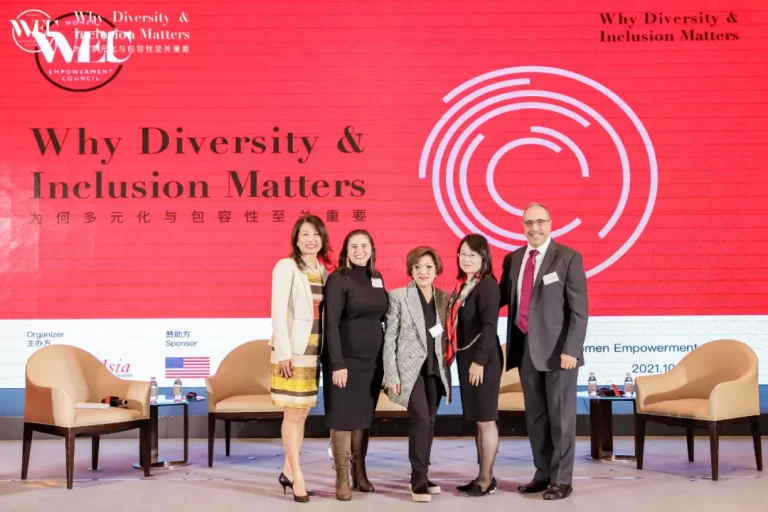
Harris-Simpson asked the first question “why women?” In response, CG Abella asked “why men?” CG Abella noted that she is in her position not because she has some “little pack of women skills” but because she is a human being. She is capable of leading a diplomatic post on behalf of her country because of her qualities and strengths as a person, not just as a woman.
Shang Rong later emphasized this point by adding that when girls are younger, if they’re smart, people tell them they are smart like a boy or strong like a boy. Even at a young age this plants a seed of inequality. Shang Rong tells her own daughter to have higher expectations and she reinforces that each person has value, which has nothing to do with their gender.
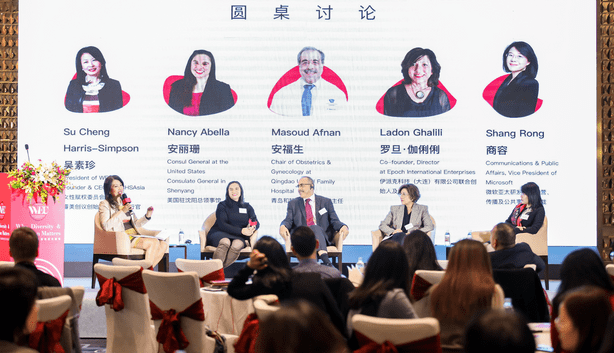
When shifting the conversation to different expectations of women in the workplace, our male ally, Dr. Afnan, also brought up the false dichotomy between women staying at home or working. The fact that right now society only women as able to choose one or the other further limits the advancement of gender equality. His one piece of advice to men: give the woman or mother preference. So many times a woman sacrifices her career or personal life, so it is important for male allies to build a better culture where women have more freedom to develop without bearing the burden or parenthood alone.
Relating to male allyship, Ladon Ghalili provided a wonderful visual of what we should strive for as a society. Ghalili had the audience imagine a bird with two wings: one representing women and the other men. She said that in order for this bird to fly, each wing needed to be strong and they needed to work together. She then asked where that bird is right now. Ghalili believes that right now we can’t even begin to imagine what we are capable of because we still do not have two, equally strong wings.

In order to give the audience a chance to dive deeper and interact with these key ideas, WEC President Su Cheng Harris-Simpson and WEC Project Manager Amy DeCillis led a workshop to break down what diversity and inclusion really is and why it matters.
To illustrate diversity, DeCillis shared her own personal story of being adopted from China by a Caucasian American family. DeCillis sited many examples from her life when having a European last name and Chinese face caused confusion, highlighting that we often judge a book by its cover and miss out on discovering what makes each person unique.
She also shared that she met another girl named Amy who is also adopted from China. Despite seeming very similar to this person, DeCillis noted that she and the other Amy were in fact very different. DeCillis emphasized that even when we may think we are all alike, there are many ways we are unique.
For inclusion, Harris-Simpson provided a great analogy: you can’t have inclusion without diversity, just like you can’t have seafood noodles without seafood. Each ingredient represents a member of a diverse workforce at any given company or organization, but this is not enough. You have to “mix” these ingredients together and actually practice inclusion in order for diversity to work.
While highlighting the importance of inclusion, Harris-Simpson also warned about the dangers of exclusion. Harris-Simpson shared a personal story from when she founded the AmCham Women Professional Committee. A male board member mentioned that it was a great that there was going to be a “club” for women. In response to this patronizing comment, Harris-Simpson responded, “well men already have representation as you can see from this (almost all-male) board, and it’s only fair and equal that women are also invited to this table and their voices are represented—don’t you agree?” This story and the male board member’s comment is a perfect example of how people exclude women from conversations, companies, and entire industries.
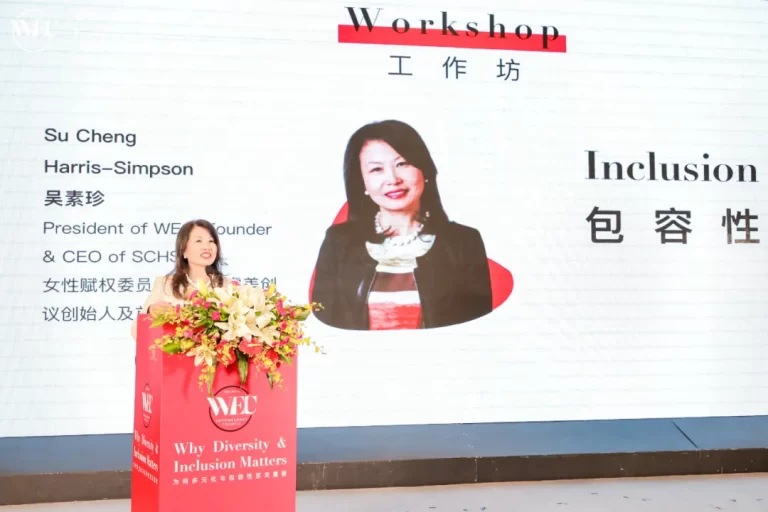
After DeCillis and Harris-Simpson shared their stories, audience members broke out into small groups at their table and discussed follow up questions related to diversity and inclusion. Here are the key takeaways from this session:
Diversity means difference
Everyone is different
Difference is valuable
Inclusion is embracing diversity
Inclusion and exclusion are within our control
Choose to include others
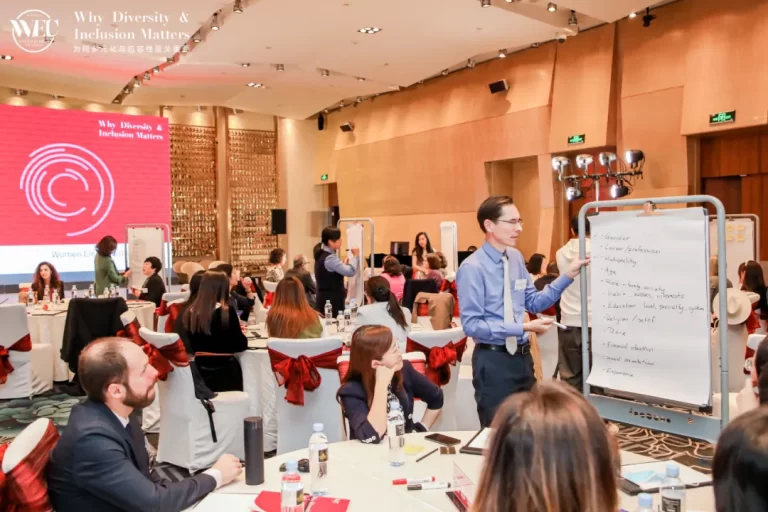
We are very thankful so many local communities joined our Diversity & Inclusion Forum in Qingdao and we hope to return in the future to dive even deeper into these important topics!
For more information about how you can get involved with the Women Empowerment Council, contact Su Cheng Harris-Simpson at sucheng@womenempowermentcouncil.com.
